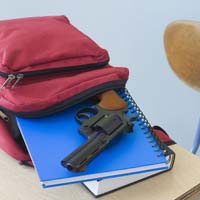“Health is a state of complete physical, mental and social well-being”, states the definition given by the World Health Organization (WHO). Nonetheless, throughout the years, society has evolved not always in positive ways, to the extent of affecting the mental health and well-being of our youth.
According to information from the Programa Integral de Atención al Adolescente (Comprehensive Adolescent Attention Program) of the Caja Costarricense del Seguro Social (CCSS), nowadays many teenagers are the result of the lack of interest or neglect of their parents, who focus their concerns solely on their children’s academic performance. Violence is not only caused by a lack of education opportunities, by drugs and alcohol abuse or by delinquent behavior, it is also the result of what is taught at home by parents and/or legal guardians.
According to the Minister of Education, Leonardo Garnier, parents are neglecting the education of their children, not teaching them essential values such as learning from and showing respect to the person that stands in front of them: their teacher who, through knowledge, is giving them important tools for their growth and development.
Currently, Costa Rica’s society is still in shock over the crime against a high school principal in Heredia, which was committed by a student who was “upset with her”. According to his parents, friends and classmates, he was a normal, peaceful boy that did not do drugs nor did he show any behavior that could have caused anyone to suspect that he could commit such an act. This is why we ask ourselves: how can a teenager, who is receiving a good, quality education, suddenly end up in a jail cell accused of murder?
According to the Instituto de Estadísticas y Censos (INEC)’s information for 2005 through 2009, 83% of the country’s suicide victims were men, 38% of them under the age of 30. In addition, 82% of murder victims were also men, 41% also under 30. In both cases, firearms played an important role.
Over time, these numbers have continuously increased while the assailant’s age has decreased. These findings inevitably suggest that young people have become progressively violent. According to Police Force Director, Erick Lacayo, almost every day, in at least one or two schools problems, fights and even street blockades arise due to conflicts between students, with bullies, with students from other schools, by students who dislike a teacher or school principal and even by parents that come to the school to cause trouble. Just in 2009, throughout the country 113,189 police operations took place at schools, while 2,585 reports were filed at the Ministerio de Educación Pública due to student conflicts. In consequence, the government has ordered that backpack and bag searches be done at public high schools (not in private high schools though, since these have administrative autonomy) in order to avoid the presence of firearms and weapons on school grounds.
Nonetheless, backpack searches are not the only solution. Violence must be prevented in a comprehensive way that involves parents, teachers, the media and society as a whole. In the classroom, besides learning about math and social studies, teenagers should be taught conflict and anger management strategies, as well as inspiring them to make a positive use of their free time and stimulating their desire to show greater interest in their schoolwork. And, of course, when a problem is detected, they must receive prompt medical attention and psychological counseling because many times the gun is not in their backpack, it is in their head.
We will be happy to answer your health-related questions,
please send them to: [email protected]
|
|

Prevention Starts at Home
By María José Zamora, M.D.
1. Be aware of what your kids see, do, look for and learn on the Internet.
2. Many painful, violence-related situations could be prevented if children and teenagers had no access to guns and weapons. If you choose to keep a firearm in your home, store it unloaded, inside a locked container in a secret hiding spot, which should be in a separate location from the ammunition. In Costa Rica, parents and legal guardians may face serious charges if their children commit a crime using a firearm that belongs, or is registered, to them.
3. According to clinical psychologist, Gianina Córdoba, from Enfoque a la Familia, as parents “we must listen more, observe more and talk less”. Spend time with your kids; know who their friends are; where they are when they are not at school, and if they are experiencing any problems with friends, peers or teachers.
4. Respect your kids, do not invade their personal space but, at the same time, do not give them so much space that you are unaware of what’s going on in their lives.
5. Always listen, to both what your kids do and do not tell you! Look for signs and behaviors that are uncommon in them. It has been proven that before committing a violent act, the attacker will previously talk about it to at least one person.
6. Share activities with them. Play soccer or see a movie together. If you are unable to spend a lot of time with them, at least offer them quality time when they are with you.
7. Do not be just a parent, be a friend: give them love, trust, respect and self-confidence.
|

